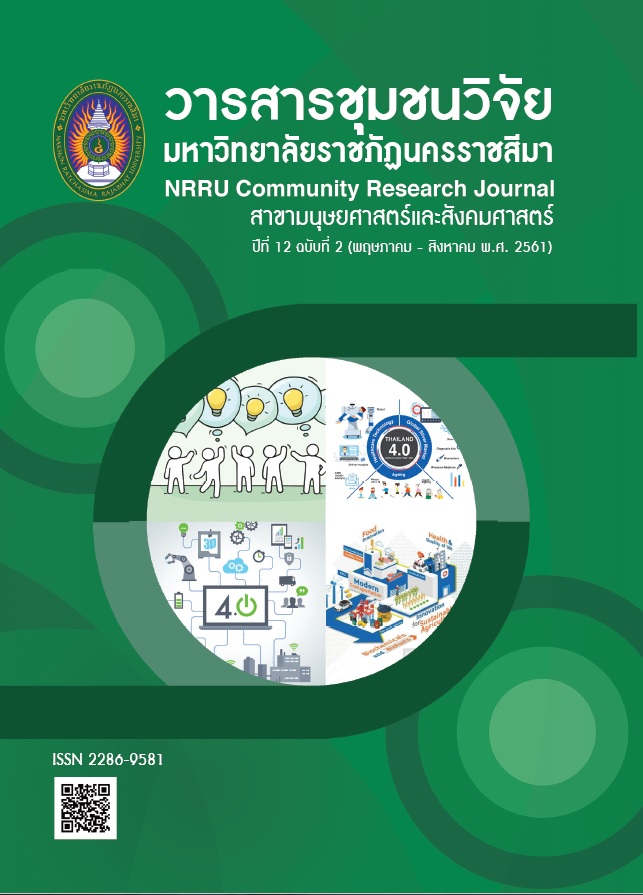ผลกระทบของผู้ถือหุ้นที่มีอำนาจควบคุมและความไม่สมมาตรของข้อมูลที่มีต่อคุณภาพกำไร หลักฐานเชิงประจักษ์จากบริษัทจดทะเบียนในตลาดหลักทรัพย์แห่งประเทศไทย
คำสำคัญ:
ผู้ถือหุ้นที่มีอำนาจควบคุม, ความไม่สมมาตรของข้อมูล, คุณภาพกำไรบทคัดย่อ
การวิจัยครั้งนี้มีวัตถุประสงค์เพื่อสำรวจผลกระทบของผู้ถือหุ้นที่มีอำนาจควบคุมและความไม่สมมาตรของข้อมูลที่มีต่อคุณภาพกำไร หลักฐานเชิงประจักษ์จากบริษัทจดทะเบียนในตลาดหลักทรัพย์แห่งประเทศไทย โดยใช้ข้อมูลทุติยภูมิ เก็บข้อมูลระหว่างปี พ.ศ. 2555 ถึง 2557 ประชากรที่ใช้ในการศึกษานี้คือบริษัทจดทะเบียนในตลาดหลักทรัพย์แห่งประเทศไทยโดยมีกลุ่มตัวอย่างจำนวน 245 บริษัทซึ่งมีผู้ถือหุ้นที่มีอำนาจควบคุมถือหุ้นตั้งแต่ 25% ขึ้นไป ตัวแปรอิสระที่ใช้ในการศึกษาครั้งนี้คือผู้ถือหุ้นที่มีอำนาจควบคุมและความไม่สมมาตรของข้อมูลและตัวแปรตามคือคุณภาพกำไร วิเคราะห์ข้อมูลโดยวิธีการวิเคราะห์สมการโครงสร้าง (SEM) ผลการศึกษาพบว่าผู้ถือหุ้นที่มีอำนาจควบคุมไม่มีผลกระทบทางตรงต่อคุณภาพกำไร นอกจากนั้นยังพบว่าผู้ถือหุ้นที่มีอำนาจควบคุมมีผลกระทบเชิงบวกกับความไม่สมมาตรของข้อมูลและความไม่สมมาตรของข้อมูลมีผลกระทบเชิงลบกับคุณภาพกำไร ซึ่งสนับสนุนข้อค้นพบจากการศึกษาที่ผ่านมา ผลลัพธ์จากการศึกษาแสดงให้เห็นว่าผู้ถือหุ้นที่มีอำนาจควบคุมมีความสัมพันธ์ทางอ้อมเชิงลบกับคุณภาพกำไรผ่านความไม่สมมาตรของข้อมูล ซึ่งสรุปได้ว่าความไม่สมมาตรของข้อมูลเป็นตัวแปรกลางระหว่างผู้ถือหุ้นที่มีอำนาจควบคุมและคุณภาพกำไร
References
Azandaryani, N. H., Javid, D., & Soleimani, H. (2014). The study of relationship between information asymmetry and concentration of ownership with profit management in the listed companies in Tehran Stock Exchange. Kuwait Chapter of the Arabian Journal of Business and Management Review, 4(1), 344-358.
Bhattacharya, N., Desai, H., & Venkataraman, K. (2013). Does Earnings Quality Affect Information Asymmetry? Evidence from Trading Costs*. Contemporary Accounting Research, 30(2), 482-516. doi: 10.1111/j.1911-3846.2012.01161.x
Boubaker, S., & Sami, H. (2011). Multiple large shareholders and earnings informativeness. Review of Accounting and Finance, 10(3), 246-266. doi: doi:10.1108/14757701111155789
Claessens, S., Djankov, S., Fan, J. P., & Lang, L. H. (2002). Disentangling the incentive and entrenchment effects of large shareholdings. The journal of finance, 57(6), 2741-2771.
Claessens, S., Djankov, S., & Xu, L. C. (2000). Corporate performance in the East Asian financial crisis. The World Bank Research Observer, 15(1), 23-46.
Cormier, D., Houle, S., & Ledoux, M.-J. (2013). The incidence of earnings management on information asymmetry in an uncertain environment: Some Canadian evidence. Journal of International Accounting, Auditing and Taxation, 22(1), 26-38. doi: http://dx.doi.org/10.1016/j.intaccaudtax. 2013.02.002
Dai, Y., Kong, D., & Wang, L. (2013). Information asymmetry, mutual funds and earnings management: Evidence from China. China Journal of Accounting Research, 6(3), 187-209. doi: http://dx.doi.org/10.1016/j.cjar.2013.03.001
Dechow, P. M., Sloan, R. G., & Sweeney, A. P. (1995). Detecting earnings management. Accounting review, 193-225.
Demise, N. (2006). OECD Principles of Corporate Governance Corporate Governance in Japan (pp. 109-117): Springer Japan.
Fan, J. P. H., & Wong, T. J. (2002). Corporate ownership structure and the informativeness of accounting earnings in East Asia. Journal of Accounting and Economics, 33(3), 401-425. doi: http://dx.doi.org/10.1016/S0165-4101(02)00047-2
Francis, J., LaFond, R., Olsson, P., & Schipper, K. (2005). The market pricing of accruals quality. Journal of Accounting and Economics, 39(2), 295-327. doi: http://dx.doi.org/10.1016/j.jacceco. 2004.06.003
Ginglinger, E., & Hamon, J. (2012). Ownership, control and market liquidity. Finance, 33(2), 61-99.
Hui-Sung Kao, T.-H. W. (2014). The Effect of IFRS, Information Asymmetry and Corporate Governance on the Quality of Accounting Information. Asian Economic and Financial Review, 4(2), 226-256.
Jei-Fang, L., & Shing-Jen, W. (2013). Controlling Shareholders and Earnings Informativeness: Evidence from Taiwan. Asia Pacific Management Review, 18(1).
Jensen, M. C., & Meckling, W. H. (1976). Theory of the firm: Managerial behavior, agency costs and ownership structure. Journal of Financial Economics, 3(4), 305-360. doi: http://dx.doi.org/ 10.1016/0304-405X(76)90026-X
Jiang, H., Habib, A., & Hu, B. (2011). Ownership concentration, voluntary disclosures and information asymmetry in New Zealand. The British Accounting Review, 43(1), 39-53. doi: http://dx.doi .org/10.1016/j.bar.2010.10.005
Jung, K., & Kwon, S. Y. (2002). Ownership structure and earnings informativeness: Evidence from Korea. The International Journal of Accounting, 37(3), 301-325. doi: http://dx.doi.org /10.1016/S0020-7063(02)00173-5
Limpaphayom, P., & Connelly, J. T. (2004). Corporate governance in Thailand. Available at SSRN 965300.
Moradi, M. A., & Nezami, A. (2011). Influence of Ownership Structure on Earning Quality in the Listed Firms of Tehran Stock Exchange. International Journal of Business Administration, 2(4), p146.
Porta, R., Lopez‐de‐Silanes, F., & Shleifer, A. (1999). Corporate ownership around the world. The journal of finance, 54(2), 471-517.
Richardson, V. J. (2000). Information asymmetry and earnings management: Some evidence. Review of Quantitative Finance and Accounting, 15(4), 325-347.
Shleifer, A., & Vishny, R. W. (1997). A survey of corporate governance. The journal of finance, 52(2), 737-783.
Sousa, E. F. d., & Galdi, F. C. (2016). The relationship between equity ownership concentration and earnings quality: evidence from Brazil. Revista de Administração, 51(4), 331-343. doi: https://doi.org/10.1016/j.rausp.2016.07.006
Trainor, J. E. (2011). Large shareholder heterogeneity: The effect on firms' accounting quality and information asymmetry. (3480604 Ph.D.), Florida Atlantic University, Ann Arbor. Retrieved from http://search.proquest.com/docview/899781490?accountid=32078 ProQuest Dissertations & Theses Global: Business database.
Velury, U., & Jenkins, D. S. (2006). Institutional ownership and the quality of earnings. Journal of Business Research, 59(9), 1043-1051. doi: http://dx.doi.org/10.1016/j.jbusres.2006.05.001
Wiwattanakantang, Y. (1999). An empirical study on the determinants of the capital structure of Thai firms. Pacific-Basin Finance Journal, 7(3–4), 371-403. doi: http://dx.doi.org/10.1016/S0927-538X(99)00007-4
Wiwattanakantang, Y. (2001). Controlling shareholders and corporate value: Evidence from Thailand. Pacific-Basin Finance Journal, 9(4), 323-362. doi: http://dx.doi.org/10.1016/S0927-538X(01)00022-1



